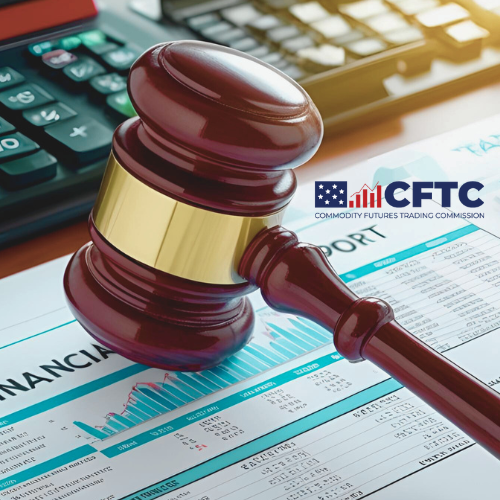Caroline Pham, the Acting Chairwoman of the CFTC, recently delivered (click here) a wide-ranging address at the FIA Boca event in Florida.
What is it about?
- In her speech the Acting Chairwoman described her plans for a “back to basics” approach, focusing on her “three Ms” - mission, markets, and mindset to drive operational efficiency through, amongst other things, accelerated reviews of long-standing open matters and investigations in order to preserve scare investigative resources;
- She also outlines key structural changes being implemented at the CFTC including moving the Market Surveillance Branch back into the Division of Market Oversight and procuring, for the first time, a modern, real-time market surveillance system to improve market oversight;
- In a somewhat radical move, she also announced a 30-day “enforcement sprint” inviting firms currently under investigation to engage with the CFTC to resolve non-customer harm or non-market abuse-related cases by self-reporting the substance of the investigation along with remediation progress and a proposed settlement offer!
Salient aspects of the Acting Chairwoman’s address are summarised below:
- As a long-time advocate for a “back to basics” approach by the CFTC, the Acting Chairwoman orientates much of her speech around this mantra;
- As Acting Chairwoman, she wants the CFTC to focus on the “three Ms” i.e. mission, markets, and mindset;
- She expresses a desire to use her experience as a managing director at Citi, an investment bank, to help return the CFTC to “regular order” and to improve operational efficiency and effectiveness;
- Her first act as Acting Chairwoman was to ask all CFTC Divisions to provide a list of all open and pending matters at the Commission – something never previously done;
- The exercise revealed an inventory of over 200 open and pending matters, some dating back over 10 years, and hundreds of investigations and enforcement matters - some dating back almost 15 years;
- Along with her executive management team, she has completed a review and prioritized all of these open and pending matters;
- In her six weeks as Acting Chairwoman, the CFTC has completed or addressed about a fifth of its open matters and dispositioned about a third of its open investigations – a move indicating progress in transforming the CFTC and improving its operational efficiency and effectiveness;
- Being very outspoken about the CFTC’s internal governance, procedures and misconduct, the new executive has taken corrective action to address these concerns as appropriate, including independent investigations and referrals to the Office of Inspector General in some cases;
- Acting Chairwoman Pham notes that she has been implementing President Trump’s Executive Orders which require the CFTC to address key issues around organizational structure, lawful governance and enforcement, and regulatory clarity – all being issues she has previously advocated for;
- Regarding Organizational Structure, she cites her May 2024 call (click here) for a Government Accountability Office (GAO) study to review the CFTC’s effectiveness as this would, in her view, make the CFTC more effective at accomplishing its mission;
- There are some improvements that the industry has discussed with CFTC leadership in the past that she believes the Commission now has an opportunity to accomplish, and which align to President Trump’s Executive Order 14210 on Federal government efficiency (click here);
- One of the efficiency measures being considered is the adoption of a shared services model for administrative functions and support at the CFTC;
- Regarding Market Surveillance, Acting Chairwoman Pham does not believe that the Market Surveillance Branch being situated in the Division of Enforcement (DOE) serves the CFTC’s mission to mitigate systemic risk and is therefore looking at moving it back into the Division of Market Oversight (DMO);
- She believes that this will improve the CFTC’s ability to monitor and respond proactively and more rapidly to market volatility, stresses, disruptions etc.;
- She highlights that the CFTC lacks a modern automated market surveillance system that can provide real-time alerts and perform cross-market analytics over futures and swaps transactions to identify fraud, manipulation, or abuse (their current system dates back to the 1990s!);
- To address this, the CFTC is about to start a procurement process to obtain a real-time market surveillance system which can be purchased “off-the-shelf” and which many of the CFTC’s counterparts around the world already have;
- Regarding FCM and DCO oversight, her team will be looking at moving the FCM team from the Market Participants Division (MPD) back into the Division of Clearing and Risk Management (DCR) to better enable a holistic view of systemic risk in the clearing system across both FCMs and DCOs;
- Regarding lawful governance and enforcement, she has previously proposed improvements to the CFTC’s internal procedures and processes for investigations, enforcement actions, and adjudications noting the recent released a new enforcement advisory on self-reporting, cooperation, and remediation that includes a first-ever matrix for mitigation (click here);
- She believes this guidance will help to ensure due process in the DOE’s investigations and enforcement actions, and it is a return to decades of prior CFTC policy on self-reporting and is aligned with best practices;
- She notes that a new advisory on enforcement referrals by the Operating Divisions will soon be released – the aim is to provide clarity on how material non-compliance issues will be referred from the operating divisions to the DOE – in future, self-reporting to the MPD, DMO, or DCR will be possible and will still be eligible for self-reporting credit;
- She notes that in recent years there has been inconsistency in how non-compliance issues are referred for enforcement action and in the interests of public transparency, the CFTC must establish and publish materiality criteria for an operating division to consider;
- She believes the criteria will ensure that the operating divisions will appropriately address supervisory or compliance issues that are not material directly with the registrant or registered entity and firms will have more clarity to determine whether to self-report a non-compliance issue without concern about a subsequent referral for enforcement action;
- Regarding material non-compliance issues – she believes that a referral to the DOE would be appropriate if the issue involves:
"especially egregious or prolonged systemic deficiencies, material weakness, or wilful misconduct by management"
- She believes that these are the types of material non-compliance issues that may be appropriate for an operating division to refer to DOE;
- She then moves to the question of how the CFTC will determine civil monetary penalties (CMPs) under the new self-reporting guidance as the CFTC has of late significantly increased the size of penalties, sometimes 10 to 20 times more than historical comparable cases;
- In response, Acting Chairwoman Pham announced a new 30-day compliance and remediation initiative or “enforcement sprint” involving the review of the CFTC’s current open investigations and enforcement cases (expressly not involving customer harm or market abuse) with the aim of resolving them in the next 30 days. The “sprint” will test the self-reporting advisory principles;
- The idea behind his initiative, according to Acting Chairwoman Pham, is to conserve the CFTC’s resources and free up DOE staff to pursue “fraudsters and scammers, and to seek recoveries for victims”;
- She notes that going forward that the CFTC will also seek to work more cooperatively with authorities at the state and Federal level in order to “leverage and scale” enforcement efforts;
- She requests that firms currently under investigation, subject to enforcement action, or engaged in DOE inquiries involving a material violation must, in the next two weeks, approach DOE staff to participate in this 30-day compliance and remediation initiative;
- Firms should provide at a minimum an update on remediation plans and progress towards completion, such as a presentation, white paper, or other submission, and a reasonable settlement offer based on historical penalties in comparable cases;
- Firms should also apply the new advisory factors, together with the mitigation credit matrix. Regarding the lookback period for penalties, firms should look at the last 10 years as a benchmark;
- Regarding regulatory clarity, this is a priority for the Acting Chairwoman - she believes it is essential for the CFTC to have open public engagement and increased transparency on its policy approach hence her announcement of several roundtables;
- She also discusses digital assets and prediction markets which are not directly relevant to energy and commodity firms and hence are not addressed further here.
 RegTrail Insights
RegTrail Insights
The Acting Chairwoman has issued a clear call to action for firms under CFTC investigation to submit a new but related self-report within the next two weeks, offering a rare chance to propose a monetary settlement. This deadline appears to fall on 25 March. Legal counsel at eligible firms will likely want to assess the risks and benefits of participating, to avoid any concerns around self-prejudice.

